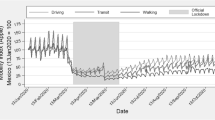Abstract
Governmental response to the Covid-19 pandemic in Poland was and still is of very controversial nature, as legislative measures introduced in March 2020 are considered by most lawyers to be unconstitutional. They were also used for purposes unrelated to the pandemic. As regards impact of the pandemic, and governmental measures on crime rates and patterns, the emerging picture is not clear: there was neither consistent growth nor decline of crime. As a matter of fact, during the year 2020, many offences tended to decline, as they did during the last couple of years. But there were some exceptions to that rule. There is no doubt that the pandemic and its accompanying measures could have had a radical impact on increasing or decreasing opportunities for various forms of crime. However, available data for the entire year 2020 do not necessarily show patterns consistent with assumptions regarding changes in opportunity structures.
Access this chapter
Tax calculation will be finalised at checkout
Purchases are for personal use only
Similar content being viewed by others
Notes
- 1.
Statistical data on COVID-19 pandemic in Poland are available at https://koronawirusunas.pl. Accessed 26 June 2021
- 2.
For additional data see Poland: Coronavirus Pandemic Country Profile. https://ourworldindata.org/coronavirus/country/poland. Accessed 24 August 2021
- 3.
Available at https://notesfrompoland.com/2021/03/17/poland-records-eus-highest-excess-death-rate-in-2020/. Accessed 26 June 2021
- 4.
To achieve this the government even tried to bypass competences of the State Electoral Commission normally responsible for organization and overview of all elections and to entrust electoral process entirely to the Polish Post. This clearly illegal attempt was finally abandoned because there were doubts even within the ruling majority. Elections took place in August in normal form and brought narrow victory for the incumbent Andrzej Duda. It is widely believed that results of the elections were not tampered with, although the electoral process was not fair.
- 5.
Under the Polish law as juveniles are treated offenders younger than 17 at the time of an offence
- 6.
Data of the State Agency for Alcohol Problems available at https://www.parpa.pl/index.php/badania-i-informacje-statystyczne/stathystyki. Accessed 22 June 2021
- 7.
These offences involve both supply and use offences, with substantial majority of registered cases being relatively petty, simple possession cases, vigorously enforced by the Polish police for years.
- 8.
The data on drunken driving are not presented on the graph because of very high rates as compared with any other offence. This would make the diagram illegible.
- 9.
Although it is true that initiation of the ‘blue card procedure’ does not depend entirely on the victim, as it may be initiated by various other agents. But in practice it is initiated first of all as a consequence of police interventions in domestic trouble, and such interventions are usually initiated by the victims.
- 10.
It may be true that in Poland many car owners do not buy Casco insurance. But this regards primarily old, used cars, and they are probably at the same time less prone to car theft. Those who own new cars usually buy Casco insurance.
References
Buczkowski, K., Czarnecka-Dzialuk, B., Klaus, W., Kossowska, A., Rzeplińska, I., Woźniakowska-Fajst, D., & Wójcik, D. (2015). Criminality and criminal justice in contemporary Poland. Sociopolitical perspectives. Routledge.
EMCDDA. (2021). European drug report. Trends and developments 2021. European Monitoring Centre for Drugs and Drug Addiction.
Felson, M. (1994). Crime and everyday life. Insight and implications for society. Pine Forge Press.
Garland, D. (2000). The culture of high crime societies. Some preconditions of recent ‘law and order’ policies. The British Journal of Criminology, 40, 347–375.
Gruszczyński, Ł., Zatoński, M., & McKee, M. (2021). Do regulations matter in fighting the COVID-19 pandemic? Lessons from Poland. https://papers.ssrn.com/sol3/papers.cfm?abstract_id=3786076.
Grzyb, M. (2018). Równość płci i przemoc wobec kobiet. Próba wyjaśnienia tzw. paradoksu skandynawskiego. Archiwum Kryminologii., 40, 221–261.
Krajewski, K. (2004). Crime and criminal justice in Poland. European Journal of Criminology, 1, 377–407.
Ostaszewski, P., Klimczak, J., Włodarczyk-Madejska, J. (2021). Przestępczość i wymiar sprawiedliwości w pierwszym roku pandemii COVID-19. Instytut Wymiaru Sprawiedliwości.
Sadurski, W. (2019). Polish constitutional tribunal under PiS: From an activist court, to a paralyzed tribunal, to a governmental enabler. Hague Journal on the Rule of Law, 11(1), 63–84.
Stanojoska, A. (2020). Crime and criminality during COVID-19 restrictive measures. Criminology – The Online Journal., 2(4), 491–504. https://www.kriminologie.de/index.php/krimoj/issue/view/6
Tuleja, P. (2020). Pandemia COVID-19 a konstytucyjne stany nadzwyczajne. Palestra, 55(9), 5–21.
Włodarczyk-Madejska, J., Ostaszewski, P., Klimczak, J., & Siemaszko, A. (2021). Nękani, oszukiwani, hakowani. Nowe i tradycyjne wymiary wiktymizacji. Instytut Wymiaru Sprawiedliwości.
Author information
Authors and Affiliations
Corresponding author
Editor information
Editors and Affiliations
Rights and permissions
Copyright information
© 2022 The Author(s), under exclusive license to Springer Nature Switzerland AG
About this chapter
Cite this chapter
Krajewski, K. (2022). Crime, Law Enforcement and Rule of Law in Time of the COVID-19 Pandemic in Poland. In: Siegel, D., Dobryninas, A., Becucci, S. (eds) Covid-19, Society and Crime in Europe. Studies of Organized Crime, vol 21. Springer, Cham. https://doi.org/10.1007/978-3-031-13562-0_4
Download citation
DOI: https://doi.org/10.1007/978-3-031-13562-0_4
Published:
Publisher Name: Springer, Cham
Print ISBN: 978-3-031-13561-3
Online ISBN: 978-3-031-13562-0
eBook Packages: Social SciencesSocial Sciences (R0)




